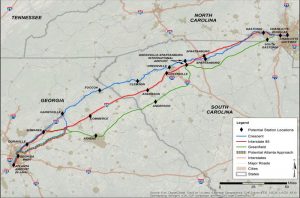Charlotte Moore
Anyone who has recently driven along Interstate 85 from Greenville to Atlanta or Charlotte knows how frustrating traveling through Upstate South Carolina is. Construction, coupled with the sheer volume of traffic on the roads, has the potential to more than double the duration of any trip.
 Even more concerning than the additional travel time for your weekend getaway, however, is the impact of this heavy traffic on the environment. With weak (although improving!) public transportation in Greenville County and the surrounding areas, the Upstate suffers from severe automobile dependence. The automobile is simply more convenient for most residents, so Greenville citizens pile into their cars and commute to work, travel across the state, or simply zip a mile or two down the road to the grocery store. This is something I see quite often even on Furman’s campus, where students will hop in their car to go anywhere, even to simply drive to class. Although the car’s reliability may be convenient, it has some major drawbacks, including increased traffic and the obvious CO2 emissions. Altogether, single-passenger cars are the opposite of sustainable transportation, defined by the Geography of Transport Systems as “the capacity to support the mobility needs of a society in a manner that is the least [damaging] to the environment and does not impair the mobility needs of future generations.”
Even more concerning than the additional travel time for your weekend getaway, however, is the impact of this heavy traffic on the environment. With weak (although improving!) public transportation in Greenville County and the surrounding areas, the Upstate suffers from severe automobile dependence. The automobile is simply more convenient for most residents, so Greenville citizens pile into their cars and commute to work, travel across the state, or simply zip a mile or two down the road to the grocery store. This is something I see quite often even on Furman’s campus, where students will hop in their car to go anywhere, even to simply drive to class. Although the car’s reliability may be convenient, it has some major drawbacks, including increased traffic and the obvious CO2 emissions. Altogether, single-passenger cars are the opposite of sustainable transportation, defined by the Geography of Transport Systems as “the capacity to support the mobility needs of a society in a manner that is the least [damaging] to the environment and does not impair the mobility needs of future generations.”
Luckily, a solution may be coming to Upstate South Carolina in the near future. In mid-October 2019, the Georgia Department of Transportation and the Federal Railroad Administration publicized their three proposals for a light rail system running between Charlotte and Atlanta. The fastest and most expensive of the three options could make the trip in just two hours, half the time it takes to travel between the cities by car. More importantly, light rail transportation systems produce 62% less in greenhouse gas emissions per

passenger mile than the average single occupancy vehicle, meaning that the adoption of such a light rail system could significantly reduce the impact of travel in the Upstate on the atmosphere.
However, only one of the three options proposed utilizes existing railway. According to the Federal Transit Administration, the construction of new fixed rail transit facilities “normally have significant effects on the environment.” These influences are detailed in the Environmental Impact Statement, and include impacts on air quality, noise pollution, wildlife, parklands and recreation areas, water resources, and biological resources.
It remains to be seen what impact, if any, the construction of a high-speed railway would have on the Interstate 85 corridor. The project is not yet definite, nor is it fully funded. Nevertheless, such an initiative could have a major impact on the development of sustainable transportation in the Upstate.
“Atlanta to Charlotte Passenger Rail Corridor Investment Plan.” Georgia Department of Transportation, Georgia Department of Transportation, Mar. 2019, www.dot.ga.gov/InvestSmart/Rail/Documents/Atl-Char/05-Affected%20Environment.pdf.
Cavallaro, Gabe. “3 Options for High-Speed Rail Route That Could Connect Greenville to Atlanta, Charlotte.” The Greenville News, The Greenville News, 23 Oct. 2019, www.greenvilleonline.com/story/news/local/2019/10/23/multi-billion-dollar-rail-could-connect-greenville-atlanta-charlotte/4052926002/?fbclid=IwAR37cnyxCg-v9vTozW9N48ciUcXqIjk49GJft3efwlMpUPo7gtGVUwU1fLY.
Rodrigue, Jean-Paul. “Transport and Sustainability.” The Geography of Transport Systems, 18 Aug. 2019, transportgeography.org/?page_id=5725.
“Transit’s Role in Environmental Sustainability.” Federal Transit Administration, United States Department of Transportation, 9 May 2016, www.transit.dot.gov/regulations-and-guidance/environmental-programs/transit-environmental-sustainability/transit-role.